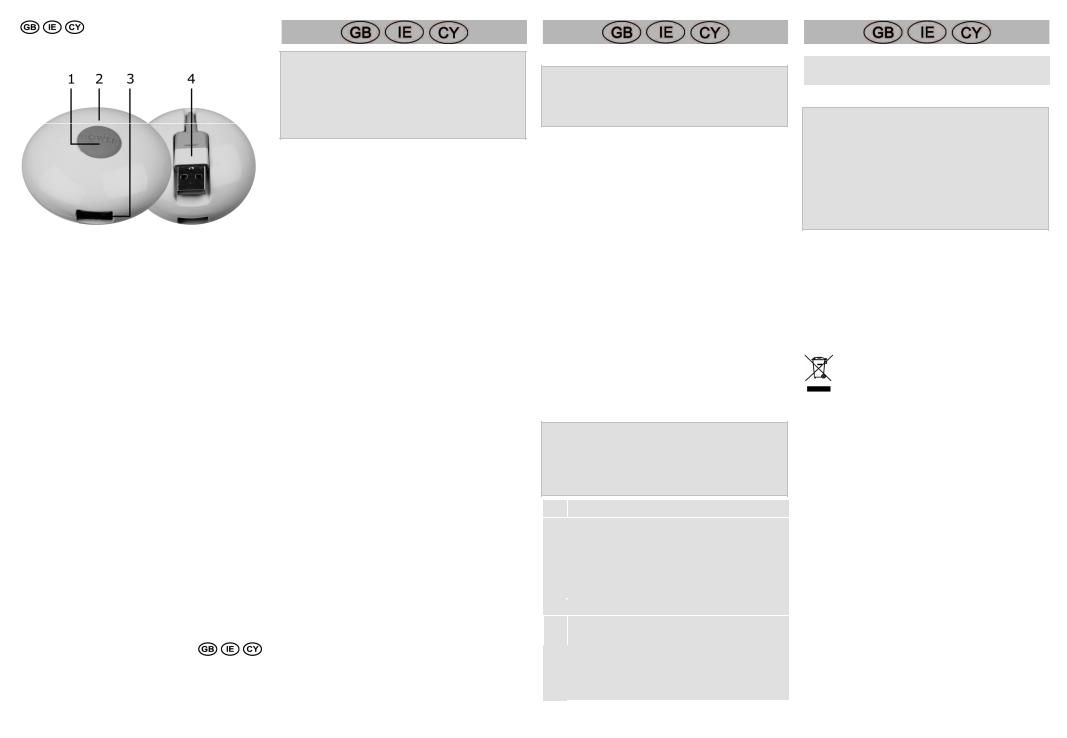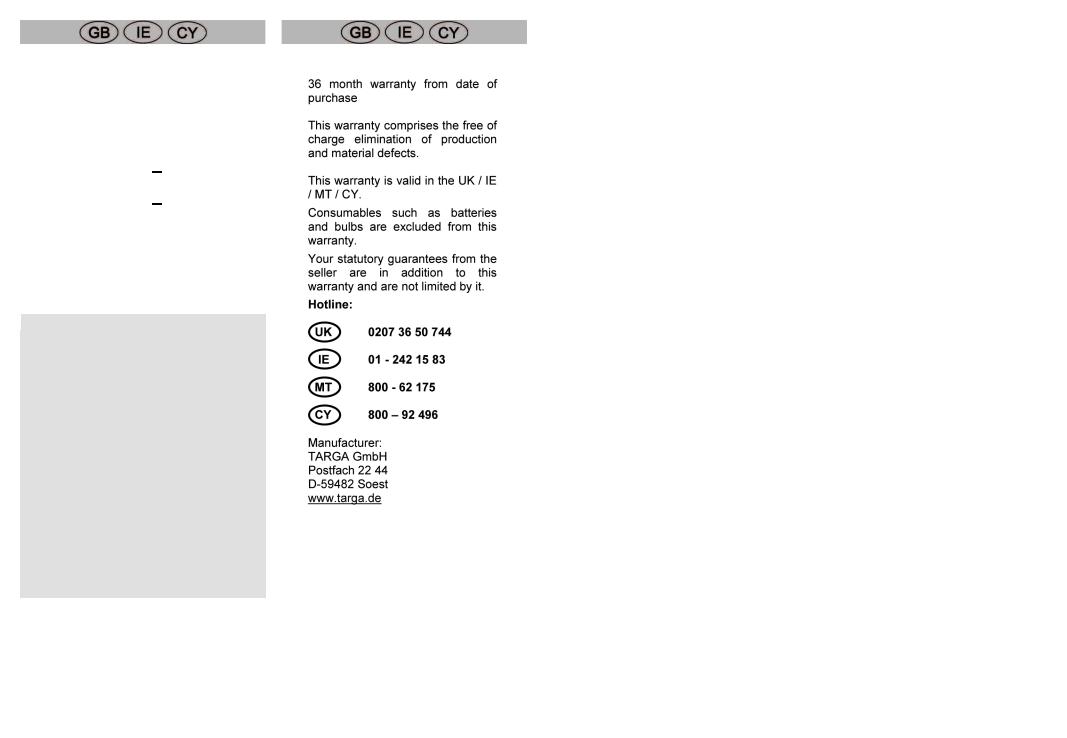Silvercrest SSB 1.0 A1 User Manual

Portable USB Charger SSB 1.0 A1
Operating and Safety Instructions
V 1.5
IAN 70999
Before you use this device for the first time please read and follow these instructions, even if you are familiar with handling electronic devices! Keep the instructions and pass them on with the device if applicable.
 In the following, this symbol indicates risks which could result in personal injury or damage.
In the following, this symbol indicates risks which could result in personal injury or damage.
Package Contents
Portable USB charger SilverCrest SSB 1.0 A1
User's Manual
Safety Instructions
Intended Use
The portable USB charger SSB 1.0 A1 is intended to be used exclusively to charge devices with a USB charger receptacle. Any use other than that mentioned above does not correspond to the intended use.
The manufacturer accepts no liability if:
the portable USB charger is not used in accordance with the intended use;
the portable USB charger is damaged or operated when incomplete or modified;
devices are connected which cannot be charged via USB. Check the documentation for the device you wish to connect.
This is an information technology device. It may only be used for private purposes, not for industrial or commercial purposes.
 General safety instructions
General safety instructions
Electrical devices should not be operated by children or people with mental or physical disabilities. Do not allow these people to use electrical devices when not under supervision. They may not understand that they can be dangerous.
Small parts can represent choking hazards. Please also note that there is a risk of suffocation if airways are blocked by the packaging film.
If smoke, unusual noises or smells are noticed, disconnect all cables immediately.
If this occurs the device should no longer be used and should be inspected by authorized service personnel.
 Operational safety
Operational safety
Do not connect devices which contain batteries to the portable USB charger, as these can explode during the charging process.
Do not use an adapter plug or extension cable which is damaged or that does not meet the required safety standards.
To disconnect a cable, hold the portable USB charger and pull on the plug, not the cable. Make sure that the cable is not kinked and is not in anyone's way.
If the portable USB charger is exposed to broad temperature fluctuations condensation can form and cause moisture which can produce a short circuit. If this occurs, use the portable USB charger only after it has reached the ambient temperature.
Operating Environment/Environmental
Conditions
Keep the portable USB charger away from moisture. Do not place any recipients containing liquids (beverages, vases, etc.) next to the device. Avoid vibrations, dust, heat and direct sunlight, otherwise the device may be damaged.
Controls and Display Elements
Fully charge your portable USB charger before using it for the first time. During the charging process, no devices must be connected to the USB socket [2].
Pos. Function, controls
1POWER button. Keep this button pressed for at least 5 seconds to start the charging process for the connected device. Charging of the connected device will continue until the portable USB charger’s battery is empty or until the charging current to the connected device stops flowing.
2Charging LED (visible when illuminated only).
3USB socket. Connect the USB cable of the device you wish to charge here.
4USB plug. Insert this plug into a USB socket (for instance a USB charger adapter or a computer) in order to charge the portable USB charger’s battery. The charging indicator [2] will light during charging.
As soon as the charging indicator [2] stops lighting, the charging process is completed.
Cleaning and care
 Disconnect the portable USB charger from the USB socket and unplug all connected devices prior to cleaning otherwise your life is in danger due to electric shock.
Disconnect the portable USB charger from the USB socket and unplug all connected devices prior to cleaning otherwise your life is in danger due to electric shock.
Furthermore, there is a risk of a short circuit causing damage to the portable USB charger and the connected device.
If dirty, clean the device with a dry cloth or use a slightly damp cloth for stubborn dirt. Do not use any solvents, irritants or gaseous cleaners. No moisture must penetrate into the adapter.
When not using the portable USB charger for a long time, recharge the built-in battery every 3 months in order to maintain battery performance.
Disposal of Old Devices
The product bears the symbol of a rubbish bin crossed out. The European Directive 2002/96/EC therefore applies.
All electrical and electronic devices must be disposed of separately from household waste at official disposal centres. For further information, contact your local government, disposal bodies or the shop where you bought the device.
The built-in rechargeable battery cannot be removed for disposal.
Legal Requirements
The portable USB charger fulfils all conformityrelevant norms and standards. Any modifications to the portable USB charger may result in these directives no longer being met.
If you are not using the portable USB charger within the Republic of Germany, you must observe the regulations and laws in the country of use.
Manufacturer: TARGA GmbH, Postfach 2244, D- 59482 Soest, Germany
Conformity Notice
The portable USB charger complies with the basic and other relevant requirements of the EMC Directive 2004/108/EC.

Technical data |
|
|
|
Warranty Information |
Model |
Portable USB charger SSB 1.0 |
|
||
|
A1 |
|
||
|
|
|
|
|
Dimensions (diameter x H) |
54 x 29 mm |
|
||
|
|
|
|
|
Weight |
40 g |
|
||
|
|
|
|
|
Connection input |
USB-A plug |
|
||
|
|
|
|
|
Connection output |
USB-A socket |
|
||
|
|
|
|
|
Input voltage |
5 V |
|
|
|
|
|
|||
|
|
|
||
Input current |
500 mA |
|
||
|
|
|
||
Output voltage |
5 V |
|
|
|
|
|
|||
|
|
|
||
Output current |
1000 mA |
|
||
|
|
|
||
Battery capacity |
1000 mAh |
|
||
|
|
|
||
Compatibility |
USB 2.0, USB 1.1 |
|
||
|
|
|
||
Temperature |
10 - 35 °C |
|
||
|
|
|
||
Air humidity (rel. humidity) |
Max. 85 % |
|
||
Troubleshooting
Problem
A connected device is not charged
The portable USB charger is not being charged
Cause, action
Press and hold the POWER button
[1]for at least 5 seconds to start the charging process.
The portable USB charger battery is empty: recharge the battery.
No USB connection to the device: check the USB connection .
The charging current is lower than 160 mA. It is not possible to charge devices with a charging current lower than 160 mA.
Some devices, especially mobile telephones, require a special USB charging cable which you can buy separately. This is not a malfunction of the portable USB charger.
The connected device is faulty or cannot be charged via USB
No USB connection to power source: check the USB connection.
